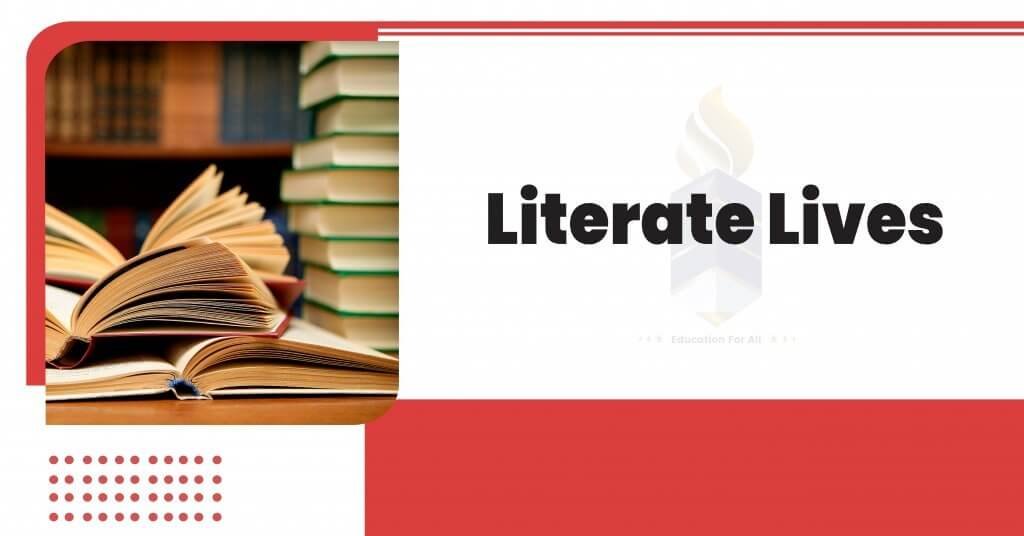Literacy is a bridge from misery to hope. ~Kofi Annan
The word literacy is very familiar to all of you as literacy simply means to be able to read and write or to having knowledge about a specific subject. When you can read, this is an example of literacy. When you are familiar with math, this is an example of literacy in mathematics. The ability to read.
But if we go through the depth of the word Literacy, it has a very important significant meaning in every individual’s life. Simply because what a person is, it’s because of his/her literate lives,
Literacy builds life skills that help people thrive throughout their lives. The life skills and types of literacy that someone needs depend on the circumstances, career, beliefs, location and many other factors.
Thus, Literate lives means everything, it’s the most important part of an individual’s life or we can say a person’s personality.
Every one is not born with silver spoon in mouth; thus, literate lives matter as that’s the most rightness method to bring up a person’s standard of living like Literacy lifts individuals out of poverty
Lacking basic reading and writing skills is a tremendous disadvantage. Literacy not only enriches an individual’s life, but it creates opportunities for people to develop skills that will help them provide for themselves and their family.
But is today’s generation actually interested in reading? When today’s kids are able to get whatever answers, they want only by asking Alexa once or by doing a google search, why would they read books or research go refer books to books to find the solution or answer to a question, now this is a big question; how is literate lives going to be in next 10 years will there will be a new meaning of literate lives
During the last summer vacation, I told my 9-year-old and 7 -year-old daughters to put down their phone for some time and find something else to do, preferably a non-screen-based activity. They agreed but only after a long argument; they were just not ready to do anything else but wanted to watch full time phone. But when they understood that I am not going to give them phone they soon started to play with each other with their Barbies, tends, tunnels and other toys available at home and very soon they started asking me if they can see phone again as they are bored of playing and they have nothing else to do. I was surprised when they said they have nothing else to do as we live in a house filled with books, I wondered not even once they thought of reading books, in fact, I can’t remember the last time I saw them pull a book from a bookshelf and sit and read. I felt that my girls have no interest to read and write and in fact for a moment I felt that their brain has been rusted as the only thing they read would be assigned texts from school, but never ventures beyond the mandatory. So, my husband and I decided to talk to them about several topics just to make them understand that seeing phone all the time will not help them in anyway; but to our surprise they where able to answers about many things that we were discussing including sports personality the geographical features of our country how to say hello in different languages etc etc… then I realised that things are changing literacy simply just does not mean to be able to read and write. One can learn many things even if they are not reading However, readers today look different than they did, even ten years ago. Like everything else, new technologies have transformed all aspects of literacy: instruction, independent reading, and engagement.
This gives rise to a larger question: In a world filled with smart technology, what does it mean to lead a literate life? How can we support students and help them thrive in a hybrid environment, where print and screen co-exist?
Kids today have search engines, blogs, social media, and social networks at their fingertips. There’s no dearth of access to information. Technology makes it easier to build learner-centred classrooms where students can pursue their favourite topics, tapping resources and expertise to build knowledge. When incorporating technology into your lesson plans, it’s important to keep student choice and agency top of mind. When students own their own reading and learning, motivation soars.
Today’s literate lives is different and it will change again in coming years but what remains is that we make space and create opportunities in our lives to do what real readers and writers do, explore and embrace our reading and writing identities.
As Literacy is the door to knowledge essential to individual self-esteem and empowerment. Books in all form, play an essential role here and help to have successful literate lives.
Johncy Shine
Students D.El.Ed


